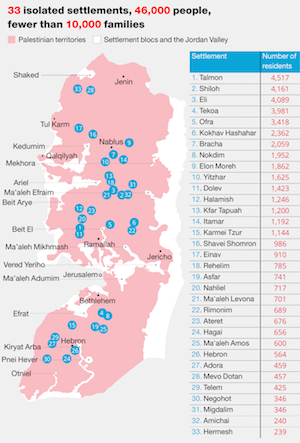According to Haaretz, all Israel has to do to maintain the relevance of the two-state solution is evacuate 9,800 Jewish families from the West Bank. How do the Palestinians factor into this vision? They do not.
By Meron Rapoport

The headline on the front page of last weekend’s Haaretz weekend magazine was a short one: ‘You Lost.’ The “you” in this case referred to the settlers. According to the subhead, a decade into Netanyahu’s rule, it turns out the settlement enterprise has failed to thwart the creation of a Palestinian state. Evacuating 9,800 Israeli families in the West Bank, according to the article, is all it would take for the two-state solution to remain viable.
With support for the two-state solution at a record low, according to a public opinion survey conducted by +972’s Dr. Dahlia Scheindlin along with Dr. Khalil Shikaki, one can understand the need to prove not only that the solution is possible, but even victorious. To prove this point, the author of the piece, Ori Mark, would rather count families, not people. It sounds more manageable to evacuate 9,800 families than 46,000 people – nine times the number of people who were evacuated from Gush Katif in the Gaza Strip during the disengagement.

But the numbers game isn’t the main problem in this analysis. The problem is that it is unclear who the real losers are, and it is even less obvious who the winners are.
The article showcased a map of the West Bank that was supposed to demonstrate that Israel would only have to evacuate 33 “isolated settlements” — a concept that was stretched to the limit in order arrive at this low number — so that the Palestinians can have a contiguous territory of their own. The settlement of Beit El, northeast of Ramallah, does not fall under that definition. Instead, it is considered part of a cluster of settlements which will be connected to Jerusalem, cutting Ramallah off from its eastern half.
The same applies to Kiryat Arba and other Jewish settlements in the Hebron area, which will be connected to Israel by way of a narrow corridor. According to the map presented in the article, an independent Palestinian state looks like a book that has been eaten by moths.
Some of these settlement clusters are very wide, yet Mark refers to them as “fingers.” Perhaps it is more accurate to describe them as a middle finger at any possibility of Palestinian sovereignty. For example, the “finger” that will include the Israeli settlements of Karnei Shomron and Kedumim in the northwestern part of the West Bank will force every resident of the city of Qalqilya who wants to travel two kilometers south to the village of Hableh to first drive 30 kilometers east to Kafr Qaddum, 30 kilometers south to Deir Istya, and then 30 kilometers west to Hableh. If they then wish to go from Hableh to Al-Lubban, a village 15 kilometers south, they would have to rack up 150 kilometers to circumvent the fingers of Ariel and its suburbs.
But all this is fine relative to the rest of the implications. According to the map, the West Bank will be split in two, with the settlement blocs reaching the outskirts of Jericho and practically disconnecting the southern part of the West Bank from the north. And the cherry on the top? The Jordan Valley will remain under Israeli control, which means that the State of Palestine will be engulfed by Israel, with no external borders of its own. A Palestinian island in Israel’s warm waters.
In other words, if the map accompanying the article is at any point offered to the Palestinians, they will view it as a crushing defeat — an obliteration of the Palestinian national project. Not a single Palestinian will see it as a victory, not even a slight or temporary one. I am willing to bet that if Palestinians are faced with the choice of having an “independent” state with the abovementioned borders or annexation by Israel — even as second-class citizens — they will select the latter. At least this way they would be able to move freely from village to village, city to city.
When Haaretz says the settlers “lost,” this does not mean the Palestinians win. Perhaps what they mean is that the Jewish Left in Israel has defeated the Right and the despised settlers. The Palestinians are only a backdrop; nobody cares to ask about their opinion.
For too many on the Jewish center-left, the main – if not the only – argument for ending the occupation and reaching a deal with the Palestinians is a demographic one. Maintaining the occupation will eventually lead to annexation, according to this argument, which is bad because it means losing the Jewish majority and giving up democracy. As such, it does not matter where the border is set, as long as it includes as many Jews and as few Palestinians as possible.
When the argument is crafted in such a way, it is clear why the settlers are the enemy: in their rush to annex the West Bank, they pose a threat to the demographic Jewish majority. The problem with this idea is that it puts Palestinians in a strange role: they have to help the Jewish Left save itself from the settlers. But when they refuse to do so, when they insist on “small details” like borders, or sovereignty in East Jerusalem and the Temple Mount/Al-Aqsa, or a fair solution to the return of refugees – these are viewed as petty, as a stumbling block in the way of the decisive battle against settlers.

The settlers lost some and won some. They won because they significantly expanded the settlements, which made it much more difficult to establish a contiguous Palestinian state, and changed the political discourse in Israel from one of negotiations and peace – as problematic as it may be – to one of unilateral action, of relying solely on Israel’s power.
But they also lost, since they have not managed to turn the West Bank into a Jewish area. Even if the prophet of right-wing demographics, Yoram Ettinger, is correct in his calculations, and there are “only” 1.9 million Palestinians in the West Bank instead of three million, as stated by an officer of the Civil Administration (Israel’s military government in the occupied territories) in a recent hearing at the Knesset –the Palestinian population is still five times that of the Israeli one in the West Bank. Except for narrow circles on the Right, most contend that the Palestinians are not going anywhere.
These partial victories and defeats have given rise to several initiatives on the Israeli Right, some of which were featured in the latest edition of Haaretz. From Minister of Education Naftali Bennett’s proposal to annex Area C in its entirety, to various forms of institutionalized apartheid, to expulsion. On one hand, these initiatives are an expression of the confidence that political power has afforded the Right and the settlers. Yet at the same time, they are also an expression of its inability to implement the idea of creating a Greater Israel.
These proposals cannot be accepted, for the simple reason that they refuse to accept the basic fact that Palestinians are entitled to equal rights — both individual and national — that Jews are. But they are not without interest, as they reveal that, despite a victorious facade, the Right too understands that the status quo cannot go on forever. This is far more important than the question of whether “we,” the Jewish Left, have defeated the settlers or not.
Meron Rapoport is an editor at Local Call, where a version of this article first appeared in Hebrew. Read it here.
